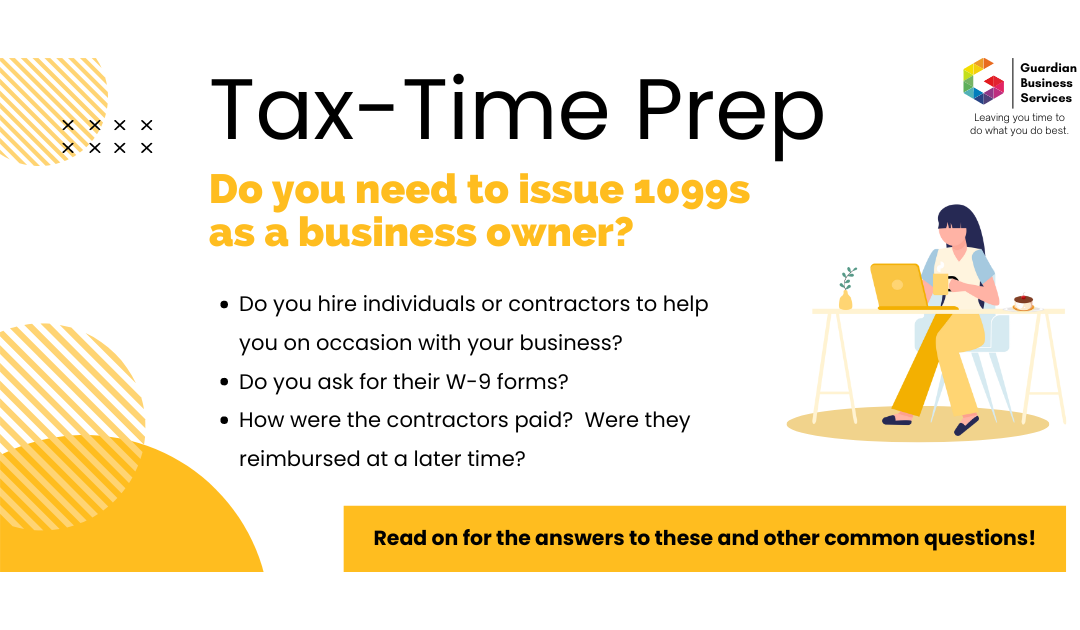If you are a business owner, you are most likely familiar with receiving various 1099s each year. However, did you know that you might actually need to issue 1099s to contractors and other individuals who perform services for you?
For example, if you’re a real estate agent, this could be the high school student you hire to put up for-sale signs, the house cleaner whose services you purchased for a closing gift, or a payment to another agent who showed a house for you.
With the 1099 deadline being January 31st of each year, it’s important to keep your records updated to avoid any issues after year-end. In this article, we’ll cover five 1099 questions that you are bound to have, helping you understand what you need to do to start preparing.

#1 – What is a W-9 form and what does it have to do with a 1099 form?
Form W-9 requests the taxpayer identification number of the individual or contractor, which can either be a Social Security Number (SSN) or Employer Identification Number (EIN). This information helps you determine which individuals/contractors need a 1099 issued.
For example, corporations and partnerships do not need 1099s issued, but individuals and single-member LLCs will.
As a best practice, request a completed W-9 from all contractors before they begin work for your business. This can save you a headache when it comes time to issue 1099s.
#2 – Do I Need to Issue a 1099 for Payments Made Through Third-Party Apps?

Third-party payment apps, like Venmo and PayPal, are becoming more popular. Starting in 2024, gross payments made to individuals over $5,000 will populate a 1099-K. The third-party payment apps will send out a 1099 on your behalf without any action needed on your end. Starting in 2025, the 1099-K threshold will be $600.
It’s important to understand that a 1099-K will only be issued if you have a business account established in the third-party app. Providers like Venmo and Zelle will not send a 1099 for transactions from an individual account to another individual account. 1099s will only be issued for payments made from a business account to an individual.
Accurate record-keeping becomes important when using third-party payment apps to send contractor payments. This is because you might have a mix of payment methods. For example, if you send a contractor $5,000 through Venmo and pay another $1,000 by writing a check, the 1099-K received by the contractor will only report $5,000. You will need to issue another 1099 for the additional $1,000.
Additionally, the 1099 reporting threshold is $600 for contractor payments. If you pay a contractor $1,000 through PayPal, PayPal will not issue a 1099 for the 2024 year because the amount is under the reporting requirement. However, you will still be required to issue a 1099.
#3 – Are Expense Reimbursements Included in a 1099?
Generally, yes. It’s not uncommon to receive reimbursement requests from contractors for certain expenses, like office supplies or mileage. However, one of the main factors that differentiates a contractor from an employee is that contractors pay for their own job expenses.
Issuing reimbursements that are not included in the 1099 can potentially lead to the IRS deeming the contractor an employee, with back payroll taxes owed. Nevertheless, if you do choose to issue contractors non-taxable reimbursements, have an accountable plan in place.
An accountable plan is a policy that requires documentation and receipts for reimbursements. This plan also lays out which types of expenses are reimbursable and the procedures for submitting and paying a reimbursement.
If you don’t have an accountable plan policy that requires documentation and receipts for reimbursements, you should include expense reimbursements in the contractor’s 1099 income. If you’ve already issued contractors a reimbursement, contact us today to ensure the payment is properly categorized.
#4 – What is the Difference Between a 1099-NEC and a 1099-MISC?
There are two main types of 1099s that you will issue to contractors: the 1099-NEC and the 1099-MISC. The 1099-NEC is used to report non-employee compensation, which means payments to independent contractors for services provided. To continue with the example of a real estate agent, most will pay their contractors using Form 1099-NEC, for such services as an individual setting up for-sale signs or an agent working under them for commissions. The 1099-MISC is used to report other income, such as payments to a landlord for rent.
One of the key differences between these forms is how they are taxed at the individual level. Most 1099-NEC payments are subject to self-employment taxes, while 1099-MISC income generally reports income excluded from self-employment taxes.
Both the 1099-NEC and the 1099-MISC are due on January 31st each year. When it comes to issuing accurate forms, take the time to set your vendor up in your accounting system and select which form they should receive.
#5 – What Happens if You Make an Error on a 1099 or File Late?

Mistakes and errors do happen. The good news is that you can submit a corrected 1099. Depending on the date of the correction, the IRS allows you to submit a corrected Form 1096 and Copy A through e-file. Otherwise, you are able to make the necessary adjustments and mail a new copy to the IRS.
When it comes to adjusting previously filed 1099s, it’s crucial that you send a new copy to the recipient. 1099s are used to report income on the contractor’s individual income tax return. This means that they need the proper information before they file their return. Moreover, filing late comes with severe penalties. For the 2024 tax year, filing 1099s 30 days late comes with a potential penalty of $60 per return. 1099s issued between March and August come with a $120 penalty per return, while 1099s filed after August have a $310 penalty. Intentional disregard for filing 1099s comes with a potential penalty of $630 per return. Keeping accurate records throughout the year can help you avoid errors and mistakes on your 1099s.
The Bottom Line
Are you ready to update the 1099 information in your business? The IRS closely monitors the issuance of 1099s, which is why it’s important to stay on top of your records throughout the year. If you have any questions about issuing 1099s or updating your records, reach out today to schedule your free consultation.

